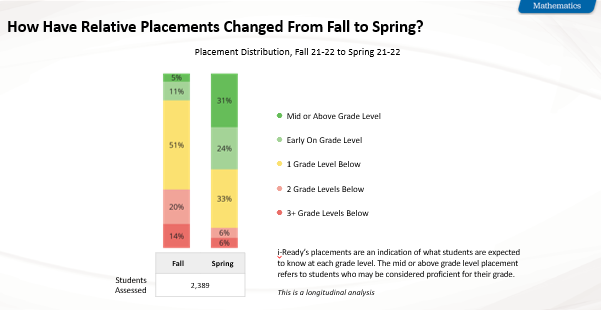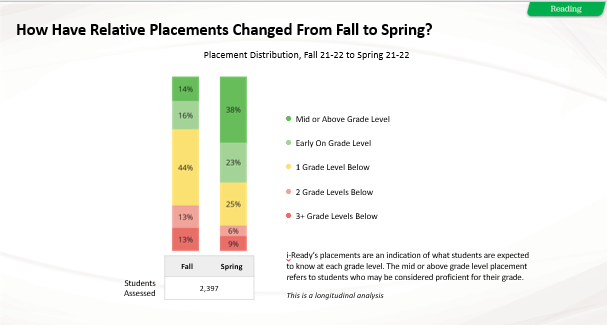Oxford, AL – While there are plenty of negative reports about student learning loss post-pandemic, Oxford City School system is beating the odds and accelerating student growth in reading and math. A recent report ranked the district 13th in the state for reading growth and 31st for mathematic growth. The Oxford City School system uses i-Ready Assessment and Instruction for math and reading for all students. They also use the Teacher Toolbox which includes resources for math, reading, and writing and adopted Curriculum Associates’ core math curriculum i-Ready Classroom Mathematics for Grades K-8.
Superintendent for the Oxford City Schools, Dr. Shannon Stanley, spoke with the Calhoun Journal about the the implementation of the new programs and what it really means for the students, teachers, and parents. Dr. Stanley stated, “Two important goals are for the school system to be a good steward for parents and students and to increase the confidence of our students.” She also explained that while she is still relatively new as superintendent she is not new to the school system. She has been a principal and graduated from OHS herself. She also considers herself lucky to have made the transition to superintendent and is excited about the direction the school system is going.

Per Dr. Stanley, there are three areas the school system is focusing on: Implementing a curriculum that strengthens the program core, teacher development, and student growth. To implement the curriculum changes the schools are focusing on a diagnostic evaluation of reading and math growth. The new curriculum focuses on support and training for educators and staff from the district level down and allows instruction partners to work as a collaborative team and to foster an environment for growth. The key shift is on moving the focus to meet the students where their needs are and to allow the schools to do more where there are intensive needs.
To better facilitate teacher success, there are instruction partners from the district level as well as grade level. Having many different “coaches” is often hard to manage and to ensure that they know what is really happening. The Oxford school system is moving toward having core leaders and a collaborative leadership that is more involved in the depth of planning. Teachers have more voice in the direction and demands that need to be met. There isn’t one prescribed plan for all students. This allows for more responsive teaching and for making on-the-spot changes, as well as being involved in the process of planning and in making informed decisions. The focus is on accelerated learning vs backtracking. Communication is more fluid because the teachers are often the first to notice if something isn’t working. Adjustments are made on a classroom level and create conditions that allow for better communication.

For students a big change is that the focus is now on helping students understand the assessment data that is about them. Dr. Stanley explains that they are seeing the students get more invested in their own success. For math and reading there is a lot of diagnostic data and it changes as the students progress. The students get to be a part of the goal setting. The teachers and students work together. This creates a collaboration of growth. Milestones and assessments, as well as student led conferences, also get the parents involved. Having the students and parents understand the individualized pathway is key. The move is away from prerequisites and toward higher standards. These changes have allowed more “teachability” paired with the new computer adaptive programs that the school is implementing, and small group strengthening. Every student can have a truly individualized path at each level.
For those that may still be unsure, the data shows that overall the district has had tremendous improvements. The graphs below show snapshots of growth from fall to spring of last school year based on their i-Ready data.
For math:
Students performing on or above grade level increased from 16% of all students to 55% of students.
Students performing two or more grade levels below in math decreased from 34% of students to 12% of students.

For reading:
Students performing on or above grade level in reading increased from 30% of all students to 61% of students.
Students performing two or more grade levels below decreased from 26% of students to 15% of students.

The other indicator is the Education Recovery Scorecard report, which measured gains in the average math and reading scores for third through eighth graders from 2019 to 2022. In that report, Oxford City Schools ranked 13th in the state for reading growth (growing the equivalent of 0.4 grade-levels) and 31st in the state for math growth (growing the equivalent of 0.23 grade levels). Superintendent Stanley is looking forward to continued growth and improvements for all Oxford City Schools students.










